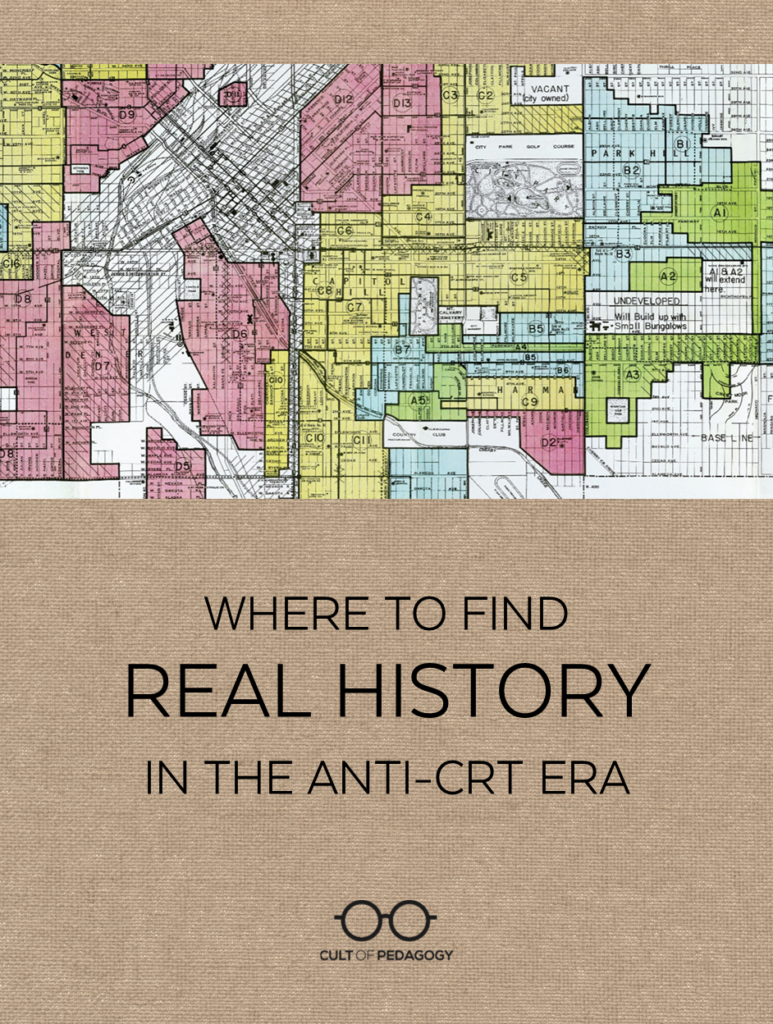
Listen to this post as a podcast:
Sponsored by EVERFI and Today by Studyo
We are living in a time when a segment of the population is working as hard as it can to keep our students ignorant of history. Dozens of states are attempting to erase history from textbooks and curriculum if it paints certain populations in an unflattering light, and teachers’ jobs are under threat in many places if they teach certain concepts.
This is no accident. It’s happening at a time when more excellent work than ever before is being published to accurately and inclusively represent history. While history books written for schools have always been heavily edited, and for generations many of the most atrocious aspects of our history amounted to little more than a quick paragraph in most of them, other materials have come along that examine history through a more critical and inclusive lens.
And that stuff, thankfully, can be found on the internet, which is still available in all 50 states — for now, anyway. If you are a student or parent living in a place where history is under attack, and you want to give yourself or your child the education that your legislators are trying to take from you, the nine outstanding resources in this post are for you.
(By the way, every year I publish a digital book called The Teacher’s Guide to Tech, and in that guide we have an extensive section dedicated to history and social studies resources, along with tons of other resources. This is just a sampling of some of the most relevant items from that section.)
The Resources
Most of what I’m going to share here are websites that contain educational materials like readings, videos, images, primary sources, and lesson plans for teachers. Ideally, they would all offer materials that anyone could use to teach history to themselves, since the students I’m reaching out to here have teachers who literally aren’t allowed to use them, but with a little creativity, that self-teaching can still happen: Either you can just sort of imagine the parts where there’s supposed to be a class discussion about something, or ask yourself the questions that a teacher is being directed to ask. I’m also imagining other scenarios where a group of former teachers in Texas, for example, starts a kind of underground after-school program using these materials. Just throwing out ideas.
I do not have a history education background, so it’s likely I will neglect to mention some important aspects of the sites I’m sharing here. If I overlook any notable features, or if you know of other free history resources that are worth a look, please mention them in the comments.
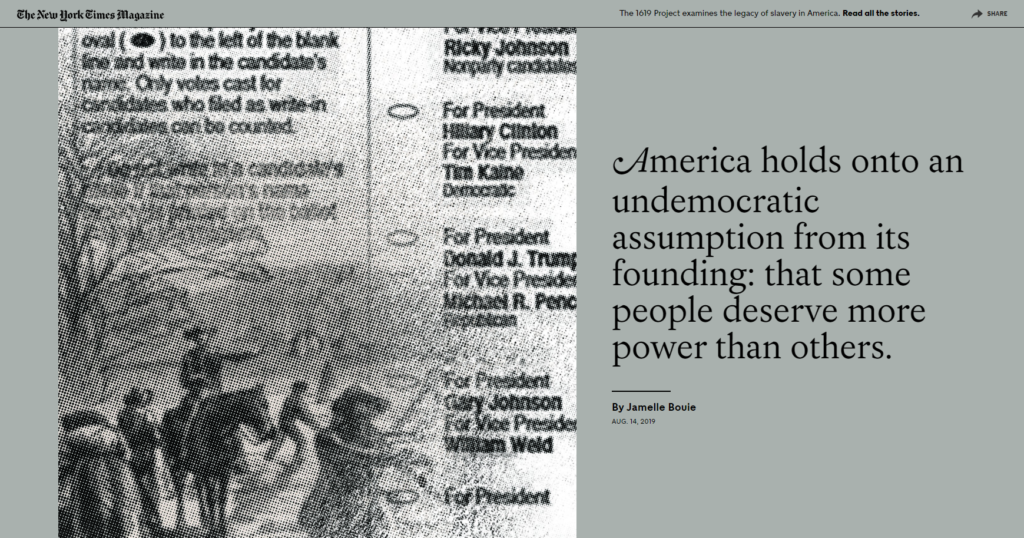
The 1619 Project
If any resource belongs at the top of a list like this one, it’s the 1619 Project. The project started in August 2019 by Nikole Hannah-Jones as a special issue of the New York Times Magazine, a collection of essays and other creative works that “illuminates the legacy of slavery in the contemporary United States, and highlights the contributions of Black Americans to every aspect of American society.” While the project was celebrated by many, it was also the target of criticism from conservatives, and this eventually grew into what we now know to be the anti-CRT movement, with some states specifically banning the use of this project.
Despite the pushback, the project has continued to expand: It now includes a podcast, a book-length anthology, a children’s book, and a curriculum.
Try a Sample: Use the Reading Guide to work your way through the essays and other creative works in the original full issue of the project as it appeared in the New York Times Magazine. Or use the listening guide to supplement your listening of the 1619 Podcast.
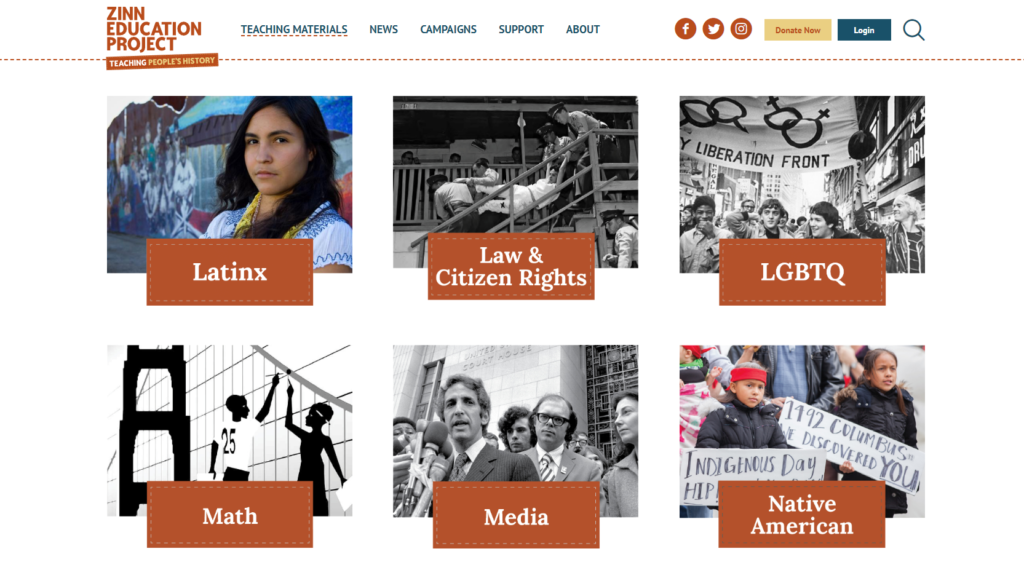
The Zinn Education Project
The materials on this site are built through the lens of history highlighted in Howard Zinn’s book A People’s History of the United States. Here’s how they explain their approach: “When we look at history from the standpoint of the workers and not just the owners, the soldiers and not just the generals, the invaded and not just the invaders, we can begin to see society more fully, more accurately. The more clearly we see the past, the more clearly we’ll see the present — and be equipped to improve it.”
The site offers free, downloadable teaching materials organized by theme, time period, and reading level. They also offer regular online trainings and institutes for teachers.
Try a Sample: Within the Labor theme, you can find activities like this lesson on how hospital workers organized in the late 1960’s, and links to primary documents like a worker-run newspaper published by women working in the textile industry in Lowell, Massachusetts in the mid-1800s.
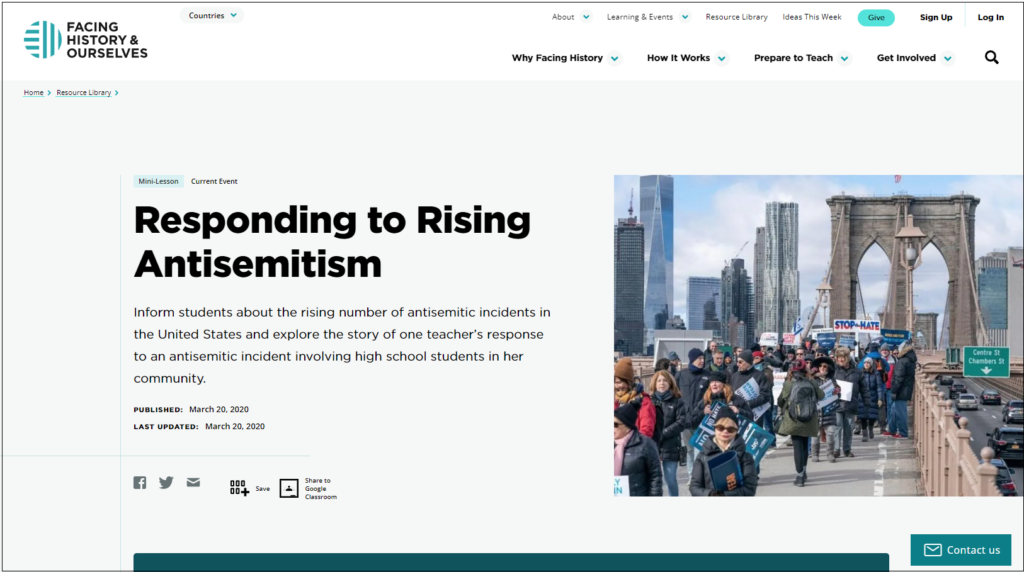
Facing History and Ourselves
The creators of Facing History want to go beyond exploring history and current events through a different lens: They also want to develop students’ ability to stand up to bigotry and hate as a result of what they learn. Their resource library offers a rich collection of free mini-lessons, readings, videos, activities, and other materials that anyone can use to teach themselves about topics like racism, genocide, migration and immigration, human and civil rights, and many other topics, and if you’re living in a place where these topics are being muted, this may be your only option. If you are a teacher working in a state with more freedom, you’ll be able to use their materials in your classroom and take advantage of Facing History’s many ongoing professional development opportunities for teachers who want to use their approach.
Try a Sample: This mini-lesson on the rise of antisemitism starts by having students do a gallery walk to explore recent incidents of antisemitism. It then moves to the story of a high school teacher who took action against antisemitism in her own school; students are then prompted to consider how her example might shape their own responses.
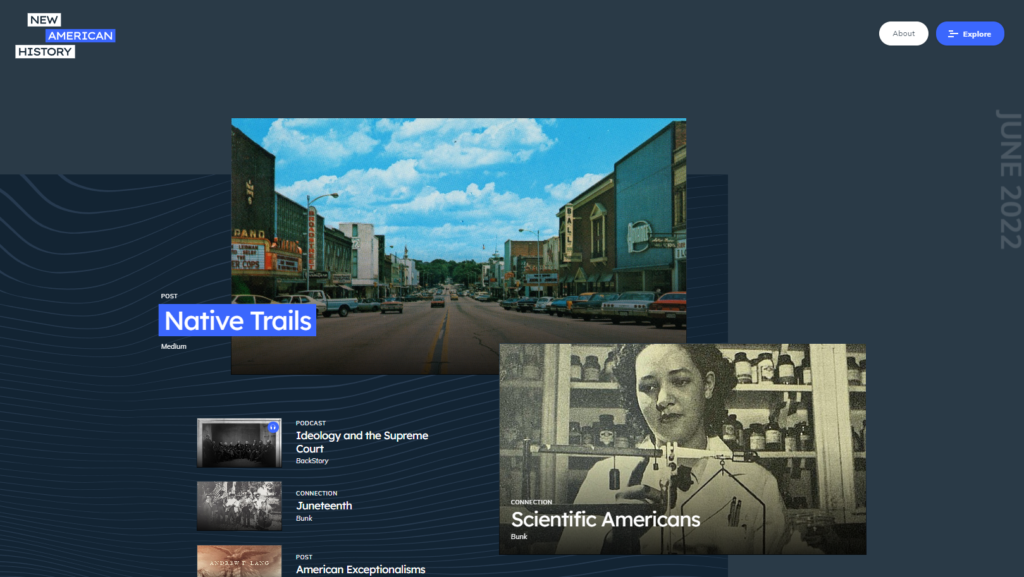
New American History
With a goal of uncovering the “untold stories and missing pieces of what we know or thought we already knew about the American past,” this site explores these histories through a fascinating combination of curated journalism, resources for teachers and students, and incredible data-rich interactive maps.
Try a Sample: Scroll through The Lasting Impact of the Trail of Tears, a multimedia lesson that explores how the Indian Removal Act and the Trail of Tears impacted Native Americans, or this lesson on Gerrymandering and Redistricting that includes interactive maps that include data from recent election years.
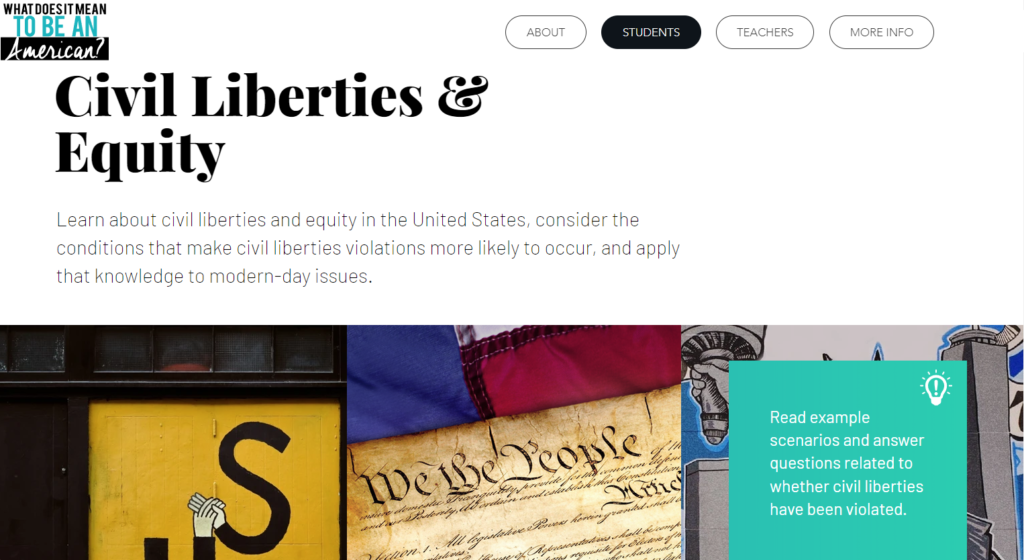
What Does it Mean to Be an American?
whatdoesitmeantobeanamerican.com
This site offers free in-depth lessons on six topics that explore the overarching question of what it means to be American, including immigration, civil liberties & equity, and civic engagement. The “lessons” are more like mini-units that would likely take several class periods to teach, and they include videos, readings, activities, and discussion topics.
Because the site was developed by the Mineta Legacy Project, which is dedicated to celebrating the life and contributions of Norman Mineta, the first Japanese American to be elected to Congress, the site contains quite a few resources focused on the lives of Japanese Americans.
Try a Sample: The Immigration lesson includes this reading on migration concepts which introduces readers to the reasons why people move from one country to another and defines key vocabulary terms, and this video, where students share their immigration stories.
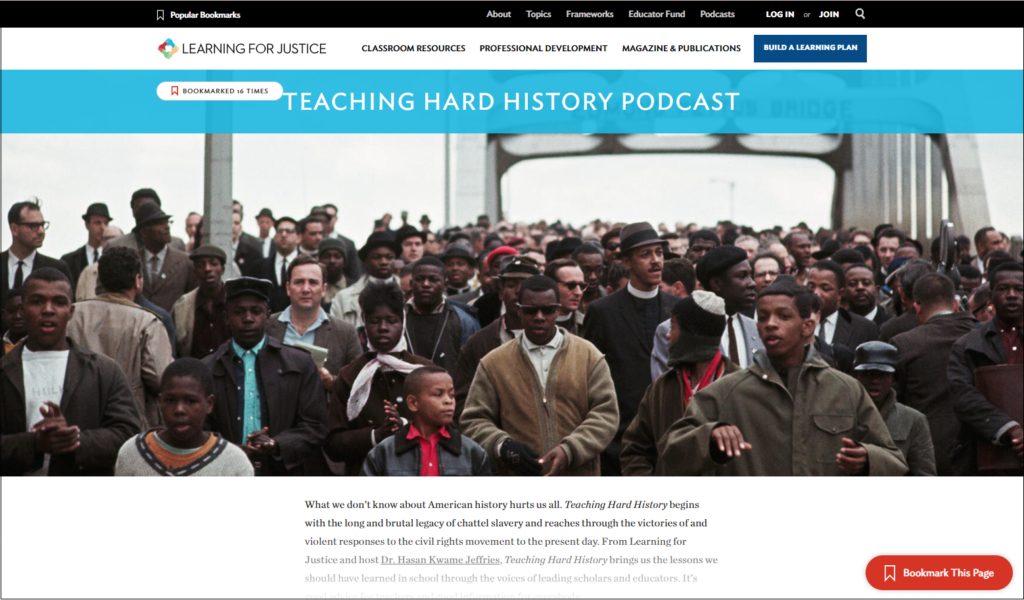
Teaching Hard History Podcast
learningforjustice.org/podcasts/teaching-hard-history
This podcast from the Learning for Justice website “brings us the lessons we should have learned in school through the voices of leading scholars and educators.” Dr. Hasan Kwame Jeffries — who I interviewed in 2018 (episode 98) when the podcast first started — is the host. In every episode, Jeffries draws insights from his own scholarship and shares the platform with many other historians to delve into a specific subtopic within a larger historical era. The first two seasons explore American Slavery, season three addresses the Civil Rights Movement, and season four examines the Jim Crow era. Although the podcast is directed at teachers and centers the conversation around classroom practice, it also offers enough fresh historical information to be a powerful learning vehicle for anyone.
Try a Sample: Listen to episode 6 of Season 3, The Jim Crow North, where Jeffries and historian Patrick Jones look into how the Civil Rights movement was not just happening in the southern states.
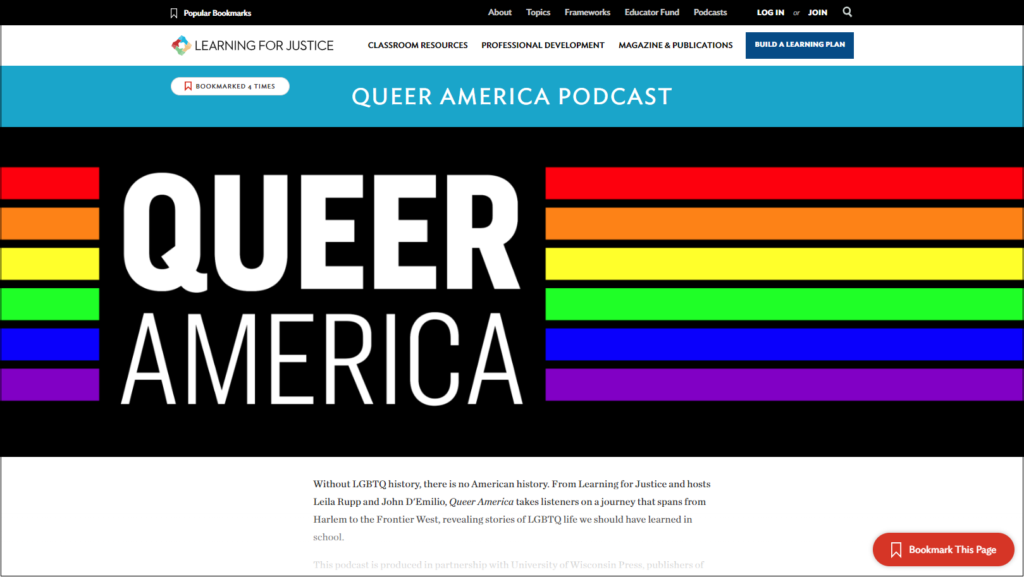
The Queer America Podcast
learningforjustice.org/podcasts/queer-america
Like Teaching Hard History, this podcast is also produced by Learning for Justice and its primary intention is to help teachers incorporate LGBTQ+ history into classroom curriculum. Sadly, this may take generations to achieve in some places, but the podcast is available to anyone anywhere who wants to teach themselves.
Try a Sample: Episode 6, The Lavender Scare, looks at the systemic firing of gay government employees that started in the 1950s on the premise that these employees were a threat to national security.
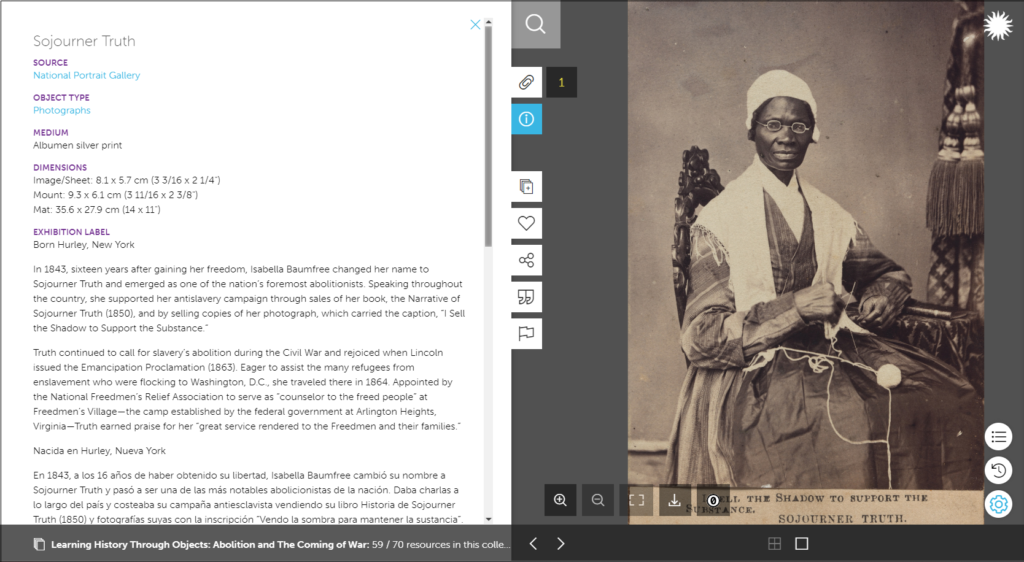
National Museum of African American History and Culture
nmaahc.si.edu/learn/digital-learning/north-star
Since the museum first opened in Washington, D.C. in 2016, its website has curated collections of digital resources through the Smithsonian Learning Lab platform. These collections thematically organize photos of objects, documents, imagery, and videos, helping visitors view history through the lens of the experience of Black Americans.
Try a Sample: Explore the Daily Acts of Resistance collection, which gathers items that illustrate how African Americans fought slavery and inequality in big ways and more subtle ways. “Using connections—family, neighbors, worship services, and formal political conventions—African Americans shared news, created networks, and developed strategies…(their) persistence and grassroots organizing still serve as a model for social activists today.”
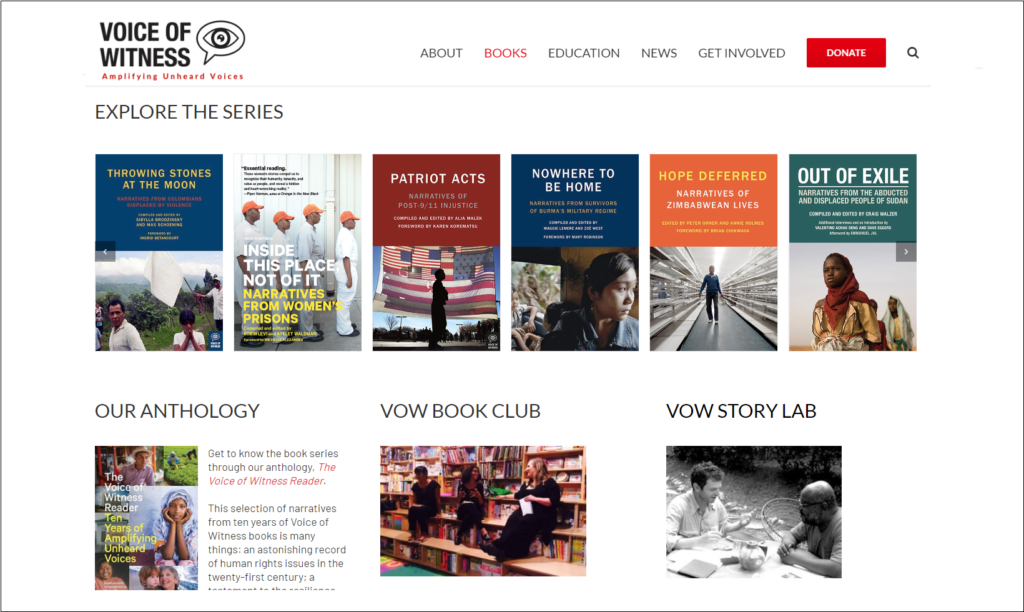
Voice of Witness
This incredible resource differs from the rest in that it is built around a series of published books, rather than free online resources, but the work is way too important to overlook. The mission of Voice of Witness is to amplify unheard voices, to tell first-person oral histories of people who are most deeply impacted by injustice but whose voices are usually never heard, such as wrongfully convicted Americans, undocumented immigrants, agricultural workers, Indigenous peoples, and communities displaced from public housing. To supplement the books, VoW offers an education program with free lesson plans, toolkits to empower students to create their own oral histories, and support for educators. To learn more about the organization, you can listen to an interview I did with their education director, Cliff Mayotte, in 2018.
Try a Sample: Mi María: Surviving the Storm, is a collection of stories from people affected by 2017’s Hurricane Maria in Puerto Rico. You can read a free excerpt here from Belle Marie Torres Velázquez, How Do You Deliver a Baby in the Middle of a Storm with One Generator, No Water, and No Electricity?
This collection is probably just a drop in a big bucket of excellent history resources that are out there just waiting to be discovered. If you know of other books, films, websites, and other resources that shine a light on all the parts of history that are currently being shoved under a rug, please share them in the comments. Thank you!
Join our mailing list and get weekly tips, tools, and inspiration that will make your teaching more effective and fun. You’ll get access to our members-only library of free downloads, including 20 Ways to Cut Your Grading Time in Half, the e-booklet that has helped thousands of teachers save time on grading. Over 50,000 teachers have already joined—come on in.



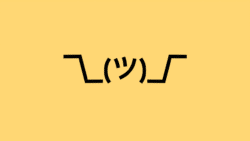

Thank you! I will add my go-to source: SHEG – Stanford History Education Group: https://sheg.stanford.edu/
Yes, thank you!
Two more; both with curricula and learning materials:
The Genocide Educational Project teaches the Armenian Genocide.
https://genocideeducation.org/
Teach Palestine
https://teachpalestine.org/
Brown University-Choices Program is great.
The Tenement Museum has excellent resources for teachers to teach about history/immigration.
Thanks for adding this!
I’ve been interested in this resource for a while and have used many of the primary sources. Wondering what others may think. I’m an ELA teacher, the perspective of a SS teacher would be appreciated and helpful.
https://www.americanyawp.com/
I’ve been a History teacher for 20 years & now partner with one of our state colleges to teach College in the High School classes. My personal opinion is that americanyawp.com is fine, depending on what you’re looking for. If it’s primary sources specifically, https://www.gilderlehrman.org/ is better.
May want to check these out:
-The Knotted Line https://knottedline.com/
-Institutional Racism: A Syllabus (via JSTOR)
https://daily.jstor.org/institutionalized-racism-a-syllabus/
-Moving the Line
https://jsteele2003.github.io/msdv_thesis/redlining/dist/index.html
-Seeing White (Podcast Series)
https://www.sceneonradio.org/seeing-white/
-Ted Ed Resources abt race in America
https://blog.ed.ted.com/2016/07/25/10-ted-classroom-resources-about-race-in-america/
-Two States, Eight Textbooks, Two American Stories (NY Times Investigation)
https://www.nytimes.com/interactive/2020/01/12/us/texas-vs-california-history-textbooks.html
Thanks for sharing these, Deb!
Thank you, Thank you, thank you…
I am filled with so much gratitude for the work you do Jennifer. I have followed you for several years, ever since I watched your book review on The Hate U Give. You inspire me to keep pushing on, teaching through the bureaucracy and fear, to find ways….
Thank you for these resources. They are reminders and guideposts and the real message that needs to be presented to our young people and yes to ALL people.
I’m going to look into VOM. I want to know more about everything but especially the VOM Book club.
Thank you,
Tracy Kepple
educator, librarian
Tracy, thanks so much for your kind words. Definitely check out Voice of Witness; they do OUTSTANDING work.
There are also the excellent resources of the Library of Congress (https://www.loc.gov/), their blog (https://blogs.loc.gov/teachers/) about using their resources, and the tps Teachers Network (https://tpsteachersnetwork.org/) which is available for anyone to join. The network is a great resource for classroom teachers who want to use primary sources to teach history. There are lots of ideas about how to use them in the classroom, but they could apply to anyone learning how to use them to interpret history. The network is also a source of support for those facing challenges in the content they can teach.
Don’t forget to check out your local history museums and their websites. Some just support the status quo, but others are doing innovative work in telling the stories of the many people who make up our history. Many also have resources on YouTube with great information.
Thanks for the suggestions, Anne!
Why haven’t you mentioned National History Day here? Social justice topics are heavily represented as research topics in History Day – and the research is quite in-depth.
Thanks for the suggestion, Crystal!
This is so important. Thankyou for the thoughtful way that you research and inform your readers on all topics related to Education (and life!). 🙂
Dori, I appreciate the kind words. Thank you!!
Thanks for all your work! There’s also Gilder Lehrman, Institute of American History: https://www.gilderlehrman.org/; I’m sure many state historical societies, but the NY Historical Society in particular is phenomenal: https://www.nyhistory.org/. They also have a specific collection bringing women’s stories to light with primary sources & curriculum for teachers: https://wams.nyhistory.org/
Thank you for your incredible work, Jennifer!
I am just learning what is offered through this resource, but I know PBS LearningMedia recently updated their US History collection for middle and high school teachers. (The link is connected to the Illinois PBS resources, but that can be changed for each state.)
https://illinois.pbslearningmedia.org/collection/us-history-collection/home/
Thank you for sharing, Melissa!
Let me add a resource here for teachers who want to teach LGBTQ+ history, but feel like they need a lot of guidance and education themselves to feel brave enough to teach it: HISTORY UNERASED is a relatively little known organization that provides resources and PD to help the true, but erased history of LGBTQ+ folks be told.
Great list, Jennifer as well as the additions in the comments.
I highly recommend the https://eji.org/ Equal Justice Intiative by Bryan Stevenson and his team in Montgomery, Alabama.
A visit to the Legacy Museum and The National Memorial for Peace and Justice is a must.
Thanks for sharing this resource, Arthur!
I love this collection! A few more I’d add from my 15 years teaching high school history:
1) “Lies My Teacher Told Me” (2018) by James Loewen – the book that made me want to be a history teacher! There’s also a Young Readers’ Edition for students ages 12-18.
2) “TeachableMoment” from the Morningside Center has a stellar set of lessons and a 2x/week email list: https://www.morningsidecenter.org/teachable-moment
3) Two NPR podcasts: Code Switch + Throughline
https://www.npr.org/podcasts/510312/codeswitch
https://www.npr.org/podcasts/510333/throughline
Thanks for adding these suggestions, Dave!
Thank you! It’s weird how the GOP wants us to read history that leaves out so much information that is so important to how this country came to be and makes it the great place it is and aspires to be. It’s kind of like a 15 year-old wanting to believe in Santa Clause, and refusing any suggestion that he might not be real.
If you want a high quality understanding of politics as far as from researching the human condition the past 7 years, the best I found was a guy on the YouTube channel called “What is politics” he does a good job of establishing definitions that are accurate across history. Like the reason the rights political platform dosent make much sense today, is they are the same platform a king would have to run in a democracy if one existed in our country. they across history are reactionary hierarchical defense activist and the left is more egalitarian offense activists. A hierarchy is by definition always defending its place of power etc. Facts don’t come in use for it except for how it helps it maintain it. That’s just how they are in every country. I think the part I really wish I had been taught about history to a large extent, is that yes it’s important to look at all the bad things and why, but rather more so, how history is not just what happened, but often a dynamic process of ingroup-outgroup conflict and their respective trans generational identity formation that becomes something that they belong to that is “bigger than themselves” and that even allows people to sacrafice their lives and or others with the sense that “what we lost today is worth it as the WE continues on facing every obstacle in our way”. In a way, I see these patterns in not just between Germans and jews but also now between Israel and Palestine , on top of how political parties fight about history, and also even to how some industry groups fight between each other across long periods of time.
Antiracistapush.com has over 40 full lessons for AP US History teachers. The lessons are designed to update the College Board’s key concepts with actual leading scholarship from the field of American History. Students love the in-depth discussions and through the activities, are not only more prepared for the AP Exam, but are able to fully contextualize the Black American experience. All students will be able to describe that even though “race” is not actually real, American racial mythology has had an enormous impact on the development of America’s political, economic, and social institutions
Thanks so much for sharing this phenomenal resource, Matt. I think a lot of high school history teachers would find this useful.
I really appreciated getting these resources as I am in my senior year of my teacher education program in the south where a lot of these restrictions are being put in place
Madison, we’re so glad you were able to find some value in the resources. Please let us know if you need any further help in this department.